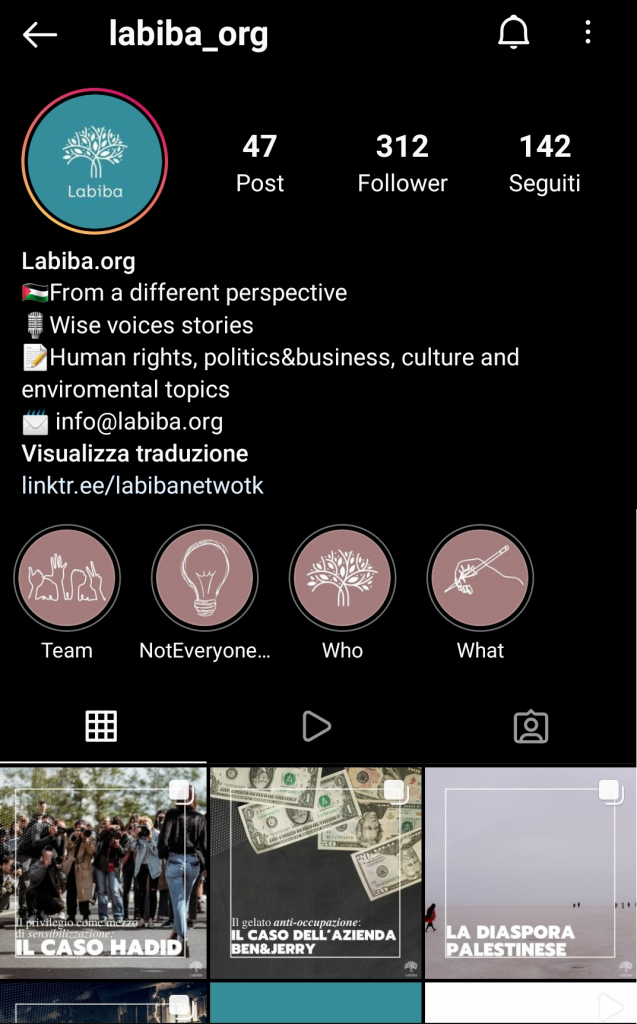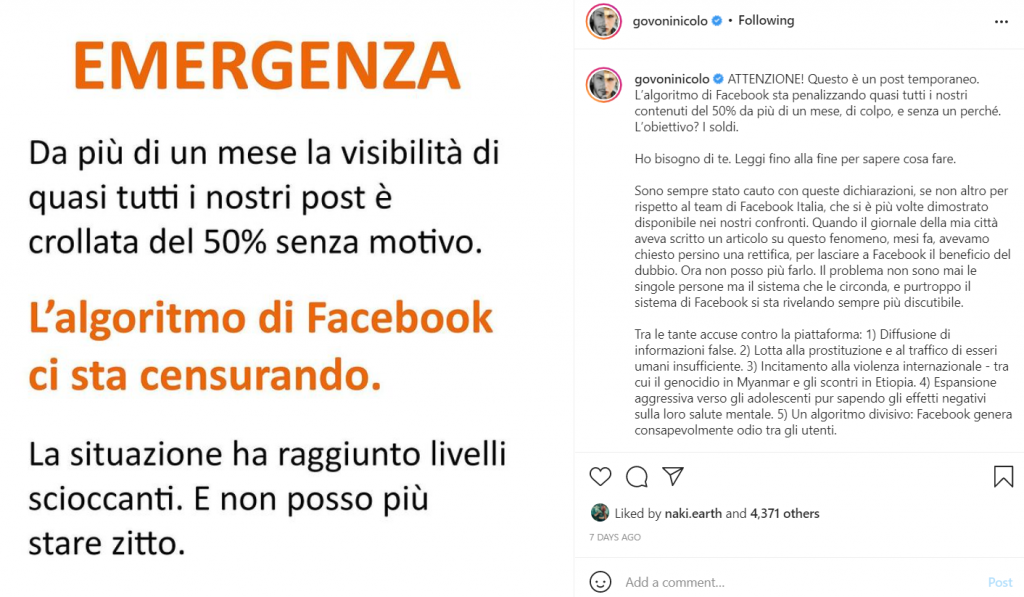“Technology in general is never either neutral or objective; it is a mirror that reflects societal bias, unfairness, and injustice.”
In May 2021, 7amleh, The Arab Center for the Advancement of Social Media, worked to document digital rights violations occurred during the 2021 Israeli attacks, and in the document Hashtag Palestine 2020 are listed detailed digital rights violations committed by government authorities and technology companies against Palestinians.
This year, Palestinian groups have been demonstrating against the Israeli Supreme Court’s decision to displace Palestinians in the East Jerusalem neighbourhood of Sheikh Jarrah. This time not radicalists nor Hamas soldiers, but young Palestinians used Facebook, Instagram, Twitter, Youtube and TikTok to document and denounce human rights violations. Social media companies started removing Palestinian content from platforms, often without clear reasons or violations and Israel arrested around 800 Palestinians because of their posts. In 2014, Israel’s world exports of cyber security and surveillance technologies exceeded its military equipment exports. Such technologies were sold to authoritarian and repressive regimes in Colombia, Kazakhstan, Mexico, South Sudan, the UAE…
THE ROLE OF SOCIAL MEDIA PLATFORMS
In many occasions, various social media platfoms silenced the voice of Palestinian people and activists. Israeli cyber units sent requests to social media platforms to take down specific content without a court order, through the use of a specific app that can be used “remove inciting content from social media, fight antisemitism and anti-zionism, and take part in special pro-Israel campaigns and efforts.”
Artificial intelligence is being used to censor pro-Palestine sentiment. Haaretz revealed that algorithms were used to build profiles of what Israel views as likely Palestinian attackers, based on a prediction of violence, rather than any actual attack – or even a plan to commit it, and the popularity of the suspect. Israeli intelligence hacked Facebook accounts to gain access to such private information as Israel occupies and controls the entire telecommunications infrastructure used by Palestinians.
Instagram has been removing Palestine content and Twitter is suspending people talking about what’s happening in #SheikhJarrah. This is censorship on a mass scale — these are the only outlets we have because western media outlets are not covering what’s happening in Jerusalem https://t.co/lF1TjvTk81 pic.twitter.com/CqBVmVf5pl
— Jennine #SaveSheikhJarrah #SaveSilwan (@jennineak) May 7, 2021
Facebook is often criticized for its lack of transparency and arbitrary decisions, and it’s regarded as “pro-Israel”, as he lists Zionists as a “globally protected group,” and that “people must not praise, support organizations that intimidate an internationally recognized state.”, and terrorism for FB includes the use of premeditated violence by non-governmental organizations “to achieve a political, religious or ideological aim.” As a result, Facebook has censored activists and journalists in disputed territories such as Palestine, Kashmir, Crimea, and Western Sahara.
Moreover, in 2016, the Israeli Justice Minister Ayelet Shaked and Public Security Minister Gilad Erdan announced an agreement between Israel and Facebook to set up teams to monitor and remove “inciteful” content. Facebook may fear being sued and Israel as a geopolitical actor. In 2015, a pro-Israeli organization, Shurat HaDin-Israel Law Center, filed a suit against Facebook because of a leaked internal document regarding content that denies the Holocaust.
Regarding Youtube, Although YouTube’s mission statement promises “to give everyone a voice and show them the world,” this is not always the case with its ongoing and unjustified declaration that some videos violate its community guidelines. This raises significant problems when it comes to users’ digital rights. YouTube is not held accountable regarding the clarity and equity of its four guidelines; it can maneuver between them interchangeably to justify content removal. One of YouTube’s justifications for using AI programming is that it could be much more efficient and fast in detecting inappropriate content. However, Dia Kayyali at WITNESS explains that while “computers might be efficient in detecting violence, they are not as nuanced as humans. They are not good at figuring out if a video is ISIS propaganda or vital evidence of human rights violations.” Whether explicitly acknowledged or not, the central aim of commercial companies developing AI is not to rectify bias generally but to infer the weaknesses and deficiencies of individual “users,” as if people existed only as objects to be manipulated”
In a range of videos, researchers found that many YouTube videos about the Israeli army and military remain on YouTube. Another incident of hate speech and harassment is the video promoted by Israeli clothing brand, Hoodies. The Islamophobic video ends with the slogan “Freedom is basic.” despite activists’ critiques, the video remains on YouTube. In interviews, Palestinian human rights defenders reported experiencing language and locative discrimination against their content on YouTube and silencing “because it is violent”.
Instagram is reported to have silenced many accounts in Palestine. The excuse by Mosseri was “many people thought we were removing their content because of what they posted or what hashtag they used, but this bug wasn’t related to the content itself, but rather a widespread issue that has now been fixed”. However, Mona Shtaya, 7amleh manager, said “The excuses that have been used by the companies, such as ‘global technical bug’ are neither logical nor convincing” she told Al Jazeera.
Many people and organisations across the world continue to face low reach and engagement on their posts on Instagram and other platforms, this is a phenomenon called “shadow banning”. Given the targeted and repeated nature of such censures, activists continue to express doubts about such explanations from social media companies, I linked here the example of Govoni, of the organization “Still I Rise”. In addition, several Palestinians in Jerusalem have reported receiving threatening text messages from Israeli Intelligence, the messages are believed to be an intimidation tactic meant to keep activists and residents of the surrounding areas from engaging in protests or other political action.
It is not only Israel and social media platforms that suppresses Palestinian social media users: The Palestinian Authority does this as well, to destroy unfavorable political views or criticisms of Palestinian leadership. The PA recently passed a law that further curbs Palestinians’ freedom to express themselves online. The controversial Electronic Crimes Law was signed by Palestinian President Abbas in 2017, without any public consultations with Palestinian civil society. The pretext of the new law is to fight online crimes,, but the law itself is in stark contravention of basic privacy protection laws and freedom of speech. It confers extensive power to state institutions to monitor, collect, and store data pertaining to online activities of Palestinians in the Occupied Palestinian Territory.
POTENTIAL SOLUTIONS
Digital rights concerns are a relatively new concept in the OPT.
– Palestinian civil society organizations have a responsibility to raise awareness about these rights, most importantly regarding digital security. Keeping one’s accounts protected and private information private should be a priority, especially for journalists and activists.
– Palestinian civil society and media must also expose and mobilize against Israel’s unethical surveilla nce practices, censorship, and persecution of Palestinians’ freedom of expression. Online campaigning (such as #FBCensorsPalestine), has proven effective in addressing social media companies’ digital rights violations due to biased positions, despite claims of neutrality.
nce practices, censorship, and persecution of Palestinians’ freedom of expression. Online campaigning (such as #FBCensorsPalestine), has proven effective in addressing social media companies’ digital rights violations due to biased positions, despite claims of neutrality.
– Social media platforms should publish transparency reports for deletions, blocks, or restrictions of content and profiles of users and it must clearly explain how a person can appeal the decision.
– Palestinians also need to build coalitions with international digital rights organizations that should ensure that AI is not hyper-surveying and discriminating against Palestinian content and that can help exert pressure on social media companies and the Israeli government to discontinue their violations.
– The human and digital rights of Palestinian children and youth should be safeguarded, and support for their activism and full protection in accordance with international lawshould be provided.
– Pressure should be exertet on Israel to comply with UN resolutions and respect international laws that protect the Palestinian population living under occupation and publicly condemn violations of these rights.
However, despite the biases, limitations and unclear policies of social media companies, their platforms have allowed for international outrage at the brutality and trauma Palestinians have been suffering for decades and protests in other countries around the world are also erupting, due in large part to mobilisation and activism through social media. Increased attention and exposure to these linguistic biases has allowed people to reject the narrative presented by Western media outlets. This is in large part due to the visibility of Palestinian voices, which are finally telling their own stories and narrating their own experiences, in spite of the limitations of social media. The censure we’ve seen big tech companies exercise paints a disconcerting picture of how easy it is to rob a person of their voice, particularly if that person belongs to a marginalised group. This is exactly why support and amplify Palestinian voices, and indeed voices of all oppressed groups, is now more important than ever.
➡️ If you want you can check Labiba’s network blog and Instagram page: here we write about Palestine “from a different perspective”.
SOURCES
Birhane A.(2019) The Algorithmic Colonization of Africa, retrieved from: https://reallifemag.com/the-algorithmic-colonization-of-africa/
Nadeem R. (2021), Silencing Palestinian Voices in the Digital Age, retrieved from: https://www.digitalrightsmonitor.pk/suppressing-palestinian-voices-in-the-digital-age/
Nashif N, Fatafta M (2017), Surveillance of Palestinians and the Fight for Digital Rights, retrieved from: https://al-shabaka.org/briefs/surveillance-palestinians-fight-digital-rights/
Nazzal A. (2020), YouTube’s Violation of Palestinian Digital Rights: What Needs to be Done, retrieved from: https://al-shabaka.org/briefs/youtubes-violation-of-palestinian-digital-rights-what-needs-to-be-done/
PAX for peace (2020), Palestinian Digital Rights, retrieved from: https://www.youtube.com/watch?v=bFC0OI_hDHQ
7amleh – The Arab Center for the Advancement of Social Media (2019), The Attacks on Palestinian Digital Rights, retrieved from: https://7amleh.org//storage/The%20Attacks%20on%20Palestinian%20Digital%20Rights.pdf
7amleh – The Arab Center for the Advancement of Social Media (2021), Unsafe spaces: How the digital rights of young Palestinians in Jerusalem are being increasingly violated online, retrieved from: https://ifex.org/unsafe-spaces-how-the-digital-rights-of-young-palestinians-in-jerusalem-are-being-increasingly-violated-online/
7amleh (2018), Digital rights in Palestine, retrieved from: https://www.youtube.com/watch?v=Ed5IAVwgLL0



